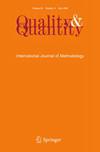Effect of women’s political inclusion on the level of infrastructures in Africa
Q1 Mathematics
引用次数: 0
Abstract
The need for gender inclusion was highlighted as the fifth sustainable development goal (SDG) (i.e. SDG5) and policies have been gearing towards attaining this objective and its subsequent effect on macroeconomic outcomes. Equally, the demonstrated trend of infrastructures in Africa in terms of stocks and future need is unique compared to the rest of the world. The objective of this study is therefore to empirically examine the effect of women’s political inclusion on infrastructural development in Africa. The results through the system GMM and Quantile Regression techniques show that women’s political inclusion enhances infrastructural development in Africa. The result is robust across different measures of infrastructures and political inclusion. Besides, the positive relationship is maintained across income groups, levels of political stability and export structure. However, the effect is not significant in countries with infrastructural scores around the extreme quantiles. The results of the study recommend African policy makers to prioritise the inclusion of women in the political agenda as one of the strategies towards the development of infrastructures. This could come through the putting in place of laws that favour women’s participation in politics. Moreover, the countries should ratify international conventions that favour gender inclusion.妇女政治参与对非洲基础设施水平的影响
性别包容的必要性被强调为第五个可持续发展目标(即可持续发展目标5),各项政策都是为了实现这一目标及其对宏观经济结果的后续影响。同样,与世界其他地区相比,非洲在库存和未来需求方面所显示的基础设施趋势是独特的。因此,本研究的目的是实证检验妇女政治参与对非洲基础设施发展的影响。通过系统GMM和分位数回归技术的结果表明,妇女的政治包容促进了非洲的基础设施发展。从基础设施和政治包容的不同衡量标准来看,结果都很强劲。此外,在不同的收入群体、政治稳定水平和出口结构之间都保持着正相关关系。然而,在基础设施得分在极端分位数附近的国家,这种影响并不显著。这项研究的结果建议非洲决策者优先考虑将妇女纳入政治议程,作为发展基础设施的战略之一。这可以通过制定有利于妇女参政的法律来实现。此外,各国应批准有利于性别包容的国际公约。
本文章由计算机程序翻译,如有差异,请以英文原文为准。
求助全文
约1分钟内获得全文
求助全文
来源期刊

Quality & Quantity
管理科学-统计学与概率论
CiteScore
4.60
自引率
0.00%
发文量
276
审稿时长
4-8 weeks
期刊介绍:
Quality and Quantity constitutes a point of reference for European and non-European scholars to discuss instruments of methodology for more rigorous scientific results in the social sciences. In the era of biggish data, the journal also provides a publication venue for data scientists who are interested in proposing a new indicator to measure the latent aspects of social, cultural, and political events. Rather than leaning towards one specific methodological school, the journal publishes papers on a mixed method of quantitative and qualitative data. Furthermore, the journal’s key aim is to tackle some methodological pluralism across research cultures. In this context, the journal is open to papers addressing some general logic of empirical research and analysis of the validity and verification of social laws. Thus The journal accepts papers on science metrics and publication ethics and, their related issues affecting methodological practices among researchers.
Quality and Quantity is an interdisciplinary journal which systematically correlates disciplines such as data and information sciences with the other humanities and social sciences. The journal extends discussion of interesting contributions in methodology to scholars worldwide, to promote the scientific development of social research.
 求助内容:
求助内容: 应助结果提醒方式:
应助结果提醒方式:


